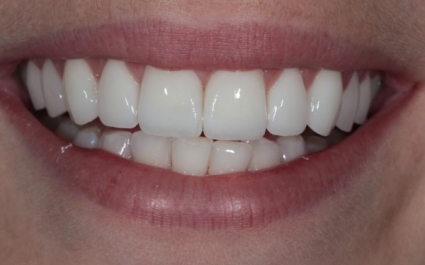Gum Treatment
Gum disease is described as swelling, soreness or infection of the tissues supporting the teeth. There are two main forms of gum disease: gingivitis and periodontal disease. Gingivitis means ‘inflammation of the gums’. This is when the gums around the teeth become very red and swollen. Often the swollen gums bleed when they are brushed during cleaning. Long-standing gingivitis can turn into periodontal disease. There are a number of types of periodontal disease and they all affect the tissues supporting the teeth. As the disease gets worse the bone anchoring the teeth in the jaw is lost, making the teeth loose. If this is not treated, the teeth may eventually fall out.


Gum Treatment - Unhealthy Gums & Healthy Gums
Restorations
Restorative dental treatments today really encompass all the disciplines that dentistry has to offer in an integrated inter-disciplinary approach to achieve optimum dental health, function and aesthetics for our patients. That’s where our expertise and experience in all aspects of restorative dentistry as well as the other disciplines helps us to achieve the best possible long-term results for our patients.

Chipped Tooth - Before & After
Smile Design
Here at Hale Bowdon Dental, we take our patient care seriously. Our friendly team of dentists, nurses and reception staff are dedicated to making sure that you have a pleasant and comfortable experience, regardless of whether you come in for general dentistry, smile makeovers or dental implants.
Dr Khan and her team are able to use a combination of braces, dental implants, veneers, crowns, composite bonding and whitening, as necessary to give their patients the smile that they want and deserve. Treatment plans are individually tailored so that the patients receive dentistry specific to their needs.


Before & After
Root Canal
Root canal treatment (also called ‘endodontics’) is needed when the blood or nerve supply of the tooth (called the ‘pulp’) is infected through decay or injury. You may not feel any pain in the early stages of the infection. In some cases your tooth could darken in colour, which may mean that the nerve of the tooth has died (or is dying). This would need root canal treatment. If the pulp becomes infected, the infection may spread through the root canal system of the tooth. This may eventually lead to an abscess. An abscess is an inflamed area in which pus collects and can cause swelling of the tissues around the tooth. The symptoms of an abscess can range from a dull ache to severe pain, and the tooth may be tender when you bite. If root canal treatment is not done, the infection will spread and the tooth may need to be taken out.


Root Canal Treatment
Implant Dentistry
Dental implants are the perfect solution to replace a single tooth, groups of two or more missing teeth, or where the teeth are completely missing in one or both jaws. Once placed, implants are used to support individual crowns or bridges, which are then attached to the implants. Dental implants can also be used to help removable dentures stay in place more securely.


